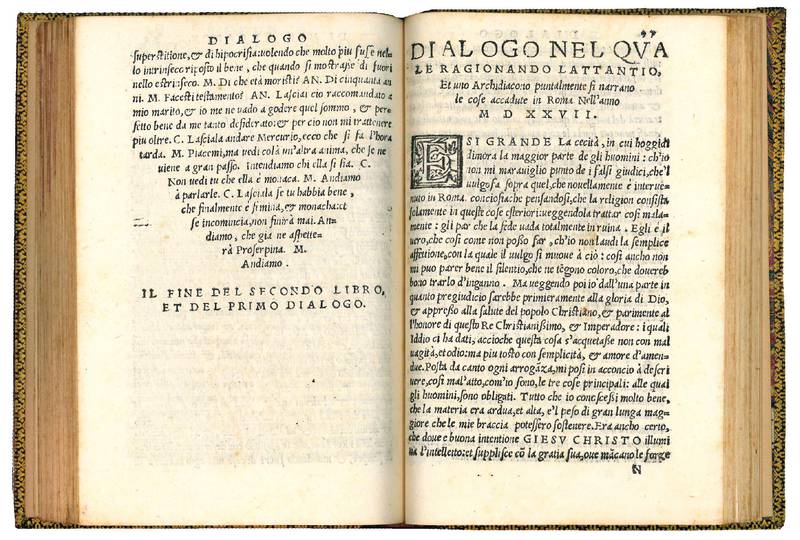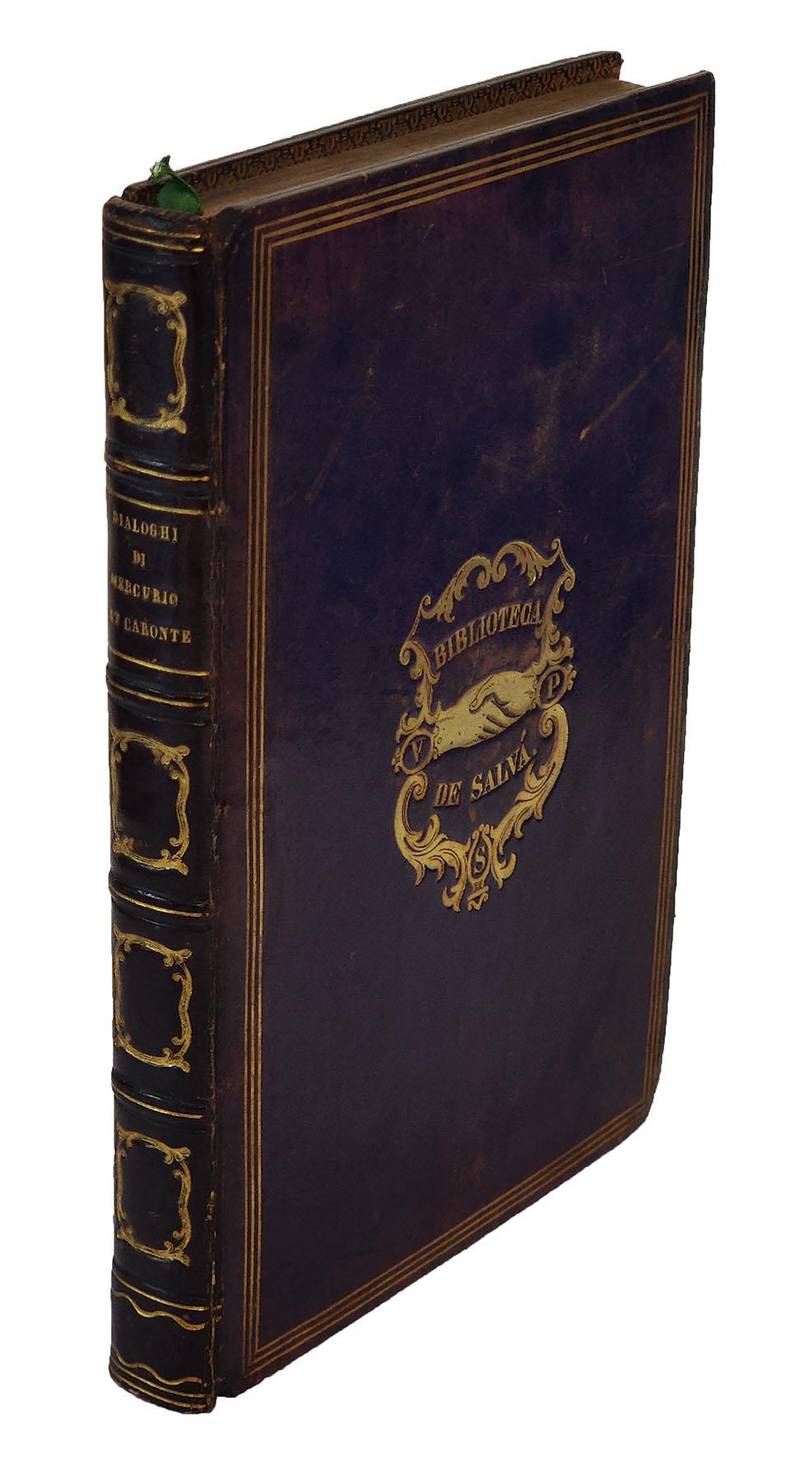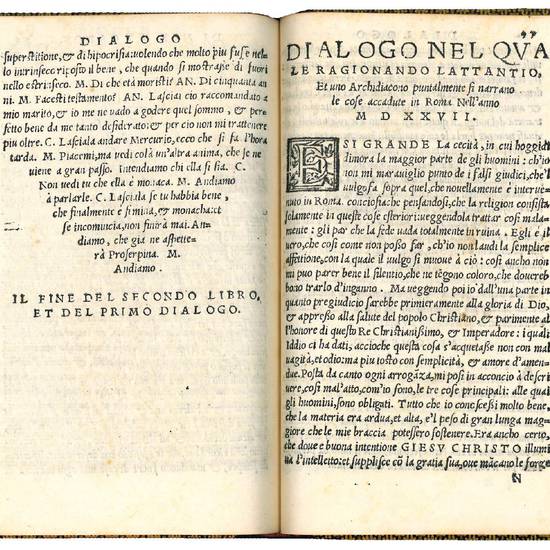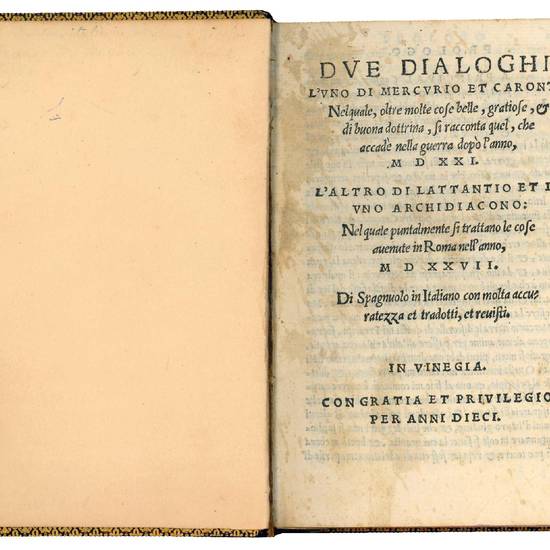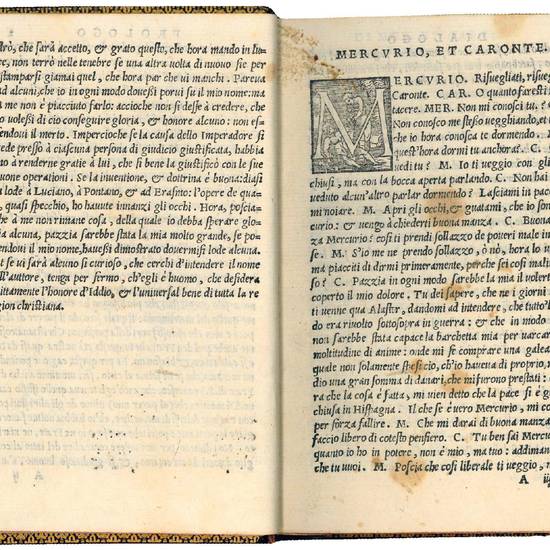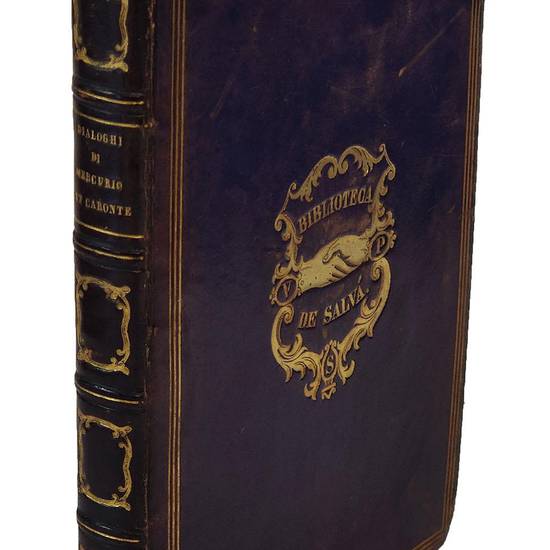Dve dialoghi, | L'vno di Mercvrio et Caronte: | Nelquale, oltre molte cose belle, gratiose, & | di buona dottrina, si racconta quel, che | accade nella guerra dopo l'anno, | M D X X I. | L'altro di Lattantio et di | vno archidiacono: | Nel quale puntalmente si trattano le cose | auenute in Roma nell'anno, |MDXXVII. | Di Spagnuolo in Italiano con molta accu- | ratezza et tradotti, et reuisti. | In Vinegia. Con gratia et privilegio | per anni dieci
Autore: VALDÉS, Alfonso de (ca. 1500/6-1532)
Tipografo: n.pr., [154?]
Dati tipografici: Venezia,
SUPPRESSED BY THE INQUISITION - THE SALVA COPY - AN APPARENTLY UNKNOWN VARIANT
8vo (151x100 mm). 148 leaves numbered consecutively, including the title. Collation: A-S8 T4. Text in italics. 19th-century morocco gilt, Biblioteca de Salvá supralibros in gilt on the panels, marbled endleaves, gilt edges. Some spotting and staining, two pages soiled, small restauration to the blank lower margin of one leaf, margins cut a bit short but not affecting the text, all in all a good copy.
AT LEAST SEVEN OTHER EDITIONS are recorded to have been printed in the years following the first edition of 1546. The present edition is very close to no. 66 (5th edition) cited by E. Boehmer, Bibliotheca Wiffeniana. Spanish Reformers of Two Centuries from 1520. Their Lives and Writings, (Strassburg & London), 1874, I, pp. 109-110, to the edition ‘E' in A. de Valdes, Due Dialoghi, G. de Gennaro, ed., Napoli, 1968, p. XIX, and to the copies recorded in Edit 16 (CNCE 73415 and 80047), and possibly also no. 98 in E. Cione, Juan de Valdés. La sua vita e il suo pensiero religioso con una completa bibliografia delle opere del Valdés e degli scritti intorno a lui, (Bari, 1938), pp. 134-135. They all have the same collation, but by closer inspection, one realizes that the text has been completely reset, and also, that the few woodcut initials used, are completely different.
This anonymous translation had been attributed to Antonio Brucioli, but more likely to Niccolò Franco, one-time secretary to Pietro Aretino, who was tried by the Inquisition and hanged at Rome in 1570. Franco was obviously in Venice at the time when Due dialoghi were printed. According to Giuseppe de Gennaro(A. de Valdes, op. cit., pp. XC-XCII) the translation is rather tendentious as shown by the numerous interpolations: “Dallo studio del testo, e sopra tutto dalle interpolazioni di vario genere, si nota la duplice intenzionalità che ispira la traduzione: un interesse remoto di affermare e divulgare i valori dello spiritualismo erasmiano-valdesiano e un interesse immediato, quello cioè di infliggere un colpo alla corrente cattolica romana, che il traduttore avversa chiaramente in un momento particolarmente critico per la cristianità, quale era quello del Concilio Tridentino”.
Valdes's first work the Dialogue of Lactancio and the Archdeacon, (written shortly after the Sack of Rome in 1527 but published only in 1529), draws on his political experience, his Spanish messianism and his imperial and Spanish antagonism to the papacy. Valdes had shown the manuscript to the papal nuncio Baldassare Castiglione. Some of the material of the Lactancio was patently critical of the Pope, and Castiglione immediately protested to the Emperor. Charles V, to whose secretarial staff Valdes belonged, submitted the work to an examination for possible heresy. The council, after argument, rejected the charge of heresy and that of Lutheranism alleged against Valdes. The Lactancio is in fact a theological vindication of the Sack of Rome and an apologia of the Emperor. At the religious level Valdes advocated Erasmus' piety, and his critique of church abuses, externals, and ceremonies (K. Bollard de Broce, Authorizing Literary Propaganda: Alfonso de Valdés' ‘Diálogo de las cosas acaecidas en Roma', (1527), in: “Hispanic Review”, 68, 2000, pp. 131-145).
The Dialogue of Mercury and Charon was finished in the summer of 1528. In the preface Valdes displays a humanistic concern in citing his sources: Lucian, Pontano and principally Erasmus. The preface also gives the reader a feeling for the atmosphere in which Valdes wrote, an atmosphere of fear, apprehension and jealousy. The main ideas which surface in these conversations are the ideal vision of life as set forth in the New Testament and the manner in which life in practice differs from this ideal picture. Valdes, thought these conversations, unmasks hypocrisy, flattery, religious insincerity, clerical corruption, false devotion, the affluent life of churchmen in opposition to the simple life, warrior-priests, corrupt monarchs, fawning courtiers, superstitious priests, sophist theologians, hypocritical preachers and a corrupt duke. In the second part of the dialogue the satire gives way to a greater seriousness of tone: Valdes here develops precepts regarding monarchy and kingship. Political appointments should be made on merit and not because of lineage, favours, or services. Here also is expressed Valdes' vision of the ideal Christian man, which has much in common with the ideas of the ‘alumbrados'. This made him, in the eyes of the Inquisition, even more dangerous than his Erasmianism (cf. A. de Valdes, Dialogue of Mercury and Charon, transl. J.V. Recapito, Bloomington, 1986, pp. XV-XVII; see also A. Coroleu, Erasmus and Alfonso de Valdés: A Note on the ‘Diálogo de Mercurio y Carón', in: “Bibliothèque d'Humanisme et Renaissance”, 57, 1995, pp. 395-399).
Valdes' dialogues became not only one of the most important vehicles for the dissemination of Erasmian ideas, but also on of the most read books in Italian reformed circles. Banned by a decree of the Inquisition Tribunal of Venice (June 22, 1557), and put on the Index (cf. J.M. de Bujanda, & al. eds, Index de Rome: 1557, 1559, 1564: les premiers index romains et l'index du Concile de Trente, Genève, 1990, p. 401), it was regarded with the Beneficio di Cristo as one of the most nefarious works to be rigorously suppressed: its possession was already a reason for a death sentence. It played an important role as a count in many inquisitional proceedings and numerous copies were burnt with their possessors: hence its great rarity.
Alfonso was one the six children of Fernando de Valdés, a nobleman of the New Castillian province of Cuenca. Nothing is known about his early education, but probably the Italian humanist Pietro Martire d'Anghiera was his private tutor. In 1520 he went to Germany with the court of Charles V in preparation for the imperial coronation. He was then attached to the secretarial staff of Charles V under the direction of Maximilianus Transylvanus, secretary for Latin correspondence. In 1521 he accompanied the Emperor to the Diet of Worms. In 1526 Alfonso himself was made secretary for Latin correspondence and known as ‘imperial secretary'. Later in that year he became a secretary to Mercurino Gattinara, chancellor to Charles V (cf. M. Rivero Rodríguez, Alfonso de Valdés y el Gran Canciller Mercurino Arborio di Gattinara: El erasmismo en la Cancillería imperial, 1527-1530, in: “e-Spania”, 13, 2012). At this time, he became Erasmus' most enthusiastic supporter at the imperial court, frequently corresponding with him and establishing and maintaining contacts with other Spanish Erasmians. After the Sack of Rome (May 1527) Valdés wrote Lactantio, whose anti-papal theme involved him in a bitter conflict with the papal nuncio, Baldassare Castiglione. In summer 1528 Valdés finished his second dialogue Mercurio y Carón. By 1529 conditions in Italy had stabilized to the point that the emperor could travel there to deal personally with the pope. Valdés accompanied Charles V, disembarking at Genoa in August 1529. From Clement VII he obtained a brief absolving him and his family of any ecclesiastical censure. In February 1530 he assisted to the coronation of the emperor at Bologna and then followed the imperial court through Italy and Germany. At the Diet of Augsburg, he dealt with Philipp Melanchthon and exercised an irenic and moderating influence. At the emperor's request he translated the Augsburg confession into Spanish. After the failing of the negotiations at Augsburg Valdés attended the coronation of Ferdinand as king of the Romans and followed the imperial court in the Netherlands and Germany. He was present at the diet of Regensburg in the summer of 1532 but did not participate to the negotiations. Finally, an unexpected plague epidemic overtook him in Vienna (October 3, 1532) and his body was buried in the Vienna Cathedral next to those of the first victims of the scourge (see D. Donald & E. Lazaro, Alfonso de Valdes y su epoca, Cuenca, 1983, passim; and J.G. Sanguán, El erasmista Alfonso de Valdes, secretario de Carlos V, in: “Baetica. Estudios de Arte, Geografia y Historia”, 22, 2000, pp. 391-410).
P. Salvá y Mallen, Catalogo de la Biblioteca de Salvá, Valencia, 1872, II, p. 468, no. 2919.
[10252]

